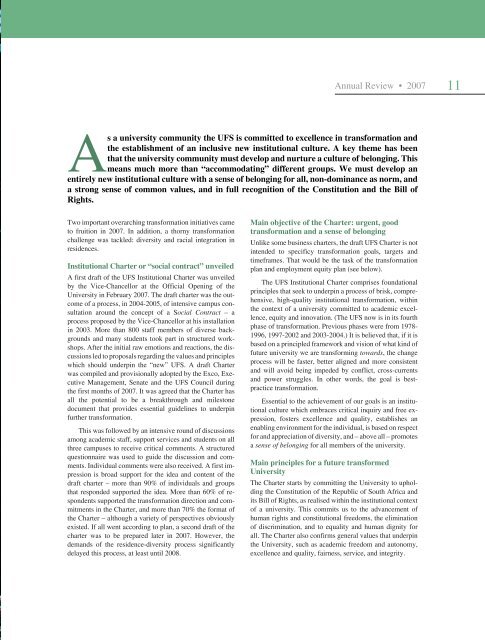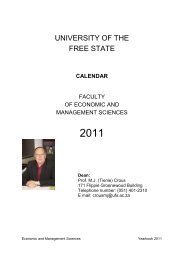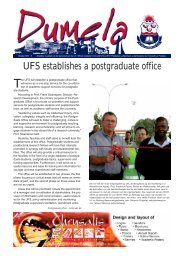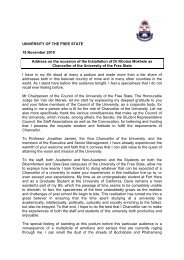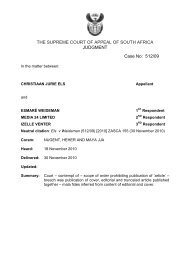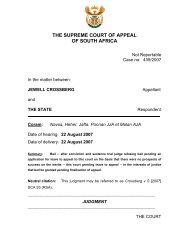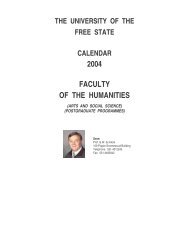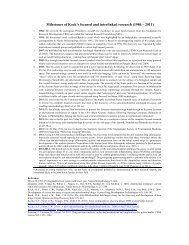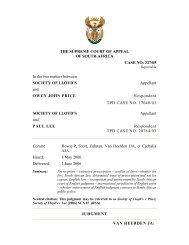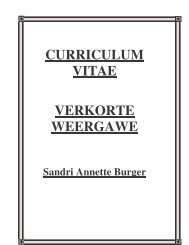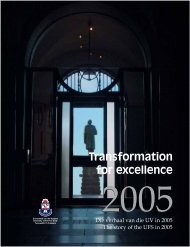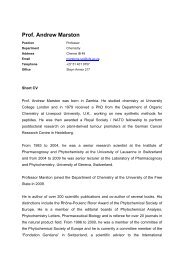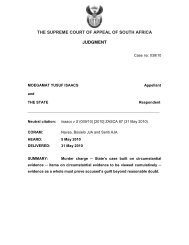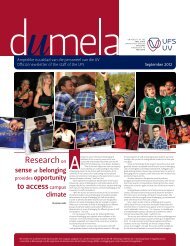UV Jaaroorsig - University of the Free State
UV Jaaroorsig - University of the Free State
UV Jaaroorsig - University of the Free State
Create successful ePaper yourself
Turn your PDF publications into a flip-book with our unique Google optimized e-Paper software.
Two important overarching transformation initiatives came<br />
to fruition in 2007. In addition, a thorny transformation<br />
challenge was tackled: diversity and racial integration in<br />
residences.<br />
Institutional Charter or “social contract” unveiled<br />
A first draft <strong>of</strong> <strong>the</strong> UFS Institutional Charter was unveiled<br />
by <strong>the</strong> Vice-Chancellor at <strong>the</strong> Official Opening <strong>of</strong> <strong>the</strong><br />
<strong>University</strong> in February 2007. The draft charter was <strong>the</strong> outcome<br />
<strong>of</strong> a process, in 2004-2005, <strong>of</strong> intensive campus consul<br />
tation around <strong>the</strong> concept <strong>of</strong> a Social Contract – a<br />
process proposed by <strong>the</strong> Vice-Chancellor at his instal lation<br />
in 2003. More than 800 staff members <strong>of</strong> diverse backgrounds<br />
and many students took part in structured workshops.<br />
After <strong>the</strong> initial raw emotions and reactions, <strong>the</strong> discus<br />
sions led to proposals regarding <strong>the</strong> values and principles<br />
which should underpin <strong>the</strong> “new” UFS. A draft Charter<br />
was compiled and provisionally adopted by <strong>the</strong> Exco, Execu<br />
tive Management, Senate and <strong>the</strong> UFS Council during<br />
<strong>the</strong> first months <strong>of</strong> 2007. It was agreed that <strong>the</strong> Charter has<br />
all <strong>the</strong> potential to be a break through and mile stone<br />
document that provides essential guidelines to under pin<br />
fur<strong>the</strong>r transformation.<br />
This was followed by an intensive round <strong>of</strong> dis cus sions<br />
among academic staff, support services and students on all<br />
three campuses to receive critical comments. A struc tured<br />
questionnaire was used to guide <strong>the</strong> discussion and comments.<br />
Individual comments were also received. A first impres<br />
sion is broad support for <strong>the</strong> idea and content <strong>of</strong> <strong>the</strong><br />
draft charter – more than 90% <strong>of</strong> individuals and groups<br />
that responded supported <strong>the</strong> idea. More than 60% <strong>of</strong> respondents<br />
supported <strong>the</strong> transformation direction and commitments<br />
in <strong>the</strong> Charter, and more than 70% <strong>the</strong> format <strong>of</strong><br />
<strong>the</strong> Charter – although a variety <strong>of</strong> perspectives ob viously<br />
existed. If all went according to plan, a second draft <strong>of</strong> <strong>the</strong><br />
charter was to be prepared later in 2007. However, <strong>the</strong><br />
demands <strong>of</strong> <strong>the</strong> residence-diversity process significantly<br />
delayed this process, at least until 2008.<br />
Annual Review • 2007 11<br />
As a university community <strong>the</strong> UFS is committed to excellence in transformation and<br />
<strong>the</strong> establishment <strong>of</strong> an inclusive new institutional culture. A key <strong>the</strong>me has been<br />
that <strong>the</strong> university community must develop and nurture a culture <strong>of</strong> belonging. This<br />
means much more than “accommodating” different groups. We must develop an<br />
entirely new institutional culture with a sense <strong>of</strong> belonging for all, non-dominance as norm, and<br />
a strong sense <strong>of</strong> common values, and in full recognition <strong>of</strong> <strong>the</strong> Constitution and <strong>the</strong> Bill <strong>of</strong><br />
Rights.<br />
Main objective <strong>of</strong> <strong>the</strong> Charter: urgent, good<br />
transformation and a sense <strong>of</strong> belonging<br />
Unlike some business charters, <strong>the</strong> draft UFS Charter is not<br />
in tended to specificy transformation goals, targets and<br />
timeframes. That would be <strong>the</strong> task <strong>of</strong> <strong>the</strong> transformation<br />
plan and employment equity plan (see below).<br />
The UFS Institutional Charter comprises foundational<br />
principles that seek to underpin a process <strong>of</strong> brisk, com prehensive,<br />
high-quality institutional transformation, within<br />
<strong>the</strong> context <strong>of</strong> a university committed to academic excellence,<br />
equity and innovation. (The UFS now is in its fourth<br />
phase <strong>of</strong> transformation. Previous phases were from 1978-<br />
1996, 1997-2002 and 2003-2004.) It is believed that, if it is<br />
based on a principled framework and vision <strong>of</strong> what kind <strong>of</strong><br />
future university we are transforming towards, <strong>the</strong> change<br />
process will be faster, better aligned and more consistent<br />
and will avoid being impeded by conflict, cross-currents<br />
and power struggles. In o<strong>the</strong>r words, <strong>the</strong> goal is bestpractice<br />
transformation.<br />
Essential to <strong>the</strong> achievement <strong>of</strong> our goals is an in sti tutional<br />
culture which embraces critical inquiry and free expres<br />
sion, fosters excellence and quality, establishes an<br />
enabling environment for <strong>the</strong> individual, is based on respect<br />
for and appreciation <strong>of</strong> diversity, and – above all – promotes<br />
a sense <strong>of</strong> belonging for all members <strong>of</strong> <strong>the</strong> university.<br />
Main principles for a future transformed<br />
<strong>University</strong><br />
The Charter starts by committing <strong>the</strong> <strong>University</strong> to up holding<br />
<strong>the</strong> Constitution <strong>of</strong> <strong>the</strong> Republic <strong>of</strong> South Africa and<br />
its Bill <strong>of</strong> Rights, as realised within <strong>the</strong> institutio nal context<br />
<strong>of</strong> a university. This commits us to <strong>the</strong> advance ment <strong>of</strong><br />
human rights and constitutional freedoms, <strong>the</strong> elimi na tion<br />
<strong>of</strong> discri mi nation, and to equality and human dignity for<br />
all. The Charter also confirms general values that underpin<br />
<strong>the</strong> <strong>University</strong>, such as academic freedom and autonomy,<br />
excellence and quality, fairness, service, and integrity.


